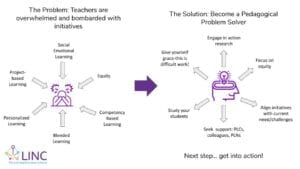Overcoming Initiative Overload: How to turn stress into strategy (Part 1)
 I sometimes get asked the question, “What are you guys really up to at LINC?” I sometimes ask the question back, curiously, “Well, what are you up to at your school?” It is at that point that I often hear about the litany of initiatives that a school or district is up to at any given time. Usually, there are at least 3 to 5 competing initiatives that teachers and leaders are wading through. It sounds something like this: “Well, social emotional learning is a big thing for us, and we just launched an equity initiative, but we are still working on personalized learning, and we have a cohort of teachers that are testing out competency based learning. Oh, and we need to get our scores up, and…”
I sometimes get asked the question, “What are you guys really up to at LINC?” I sometimes ask the question back, curiously, “Well, what are you up to at your school?” It is at that point that I often hear about the litany of initiatives that a school or district is up to at any given time. Usually, there are at least 3 to 5 competing initiatives that teachers and leaders are wading through. It sounds something like this: “Well, social emotional learning is a big thing for us, and we just launched an equity initiative, but we are still working on personalized learning, and we have a cohort of teachers that are testing out competency based learning. Oh, and we need to get our scores up, and…”
While listening, I put myself in the shoes of the teacher that is trying his or her best to navigate all of this. What this looks like is overwhelm and confusion and just trying to get through the day. It also looks like a teacher that has been told to implement a variety of strategies that may or may not be relevant or needed for his students.
This is the plight of many educators across America’s schools and districts. Sadly, we are on a treadmill that never stops and initiative overload has simply become the mode of operations. At this point, I get back to what we are up to at LINC. “Well, we believe that more important than any specific initiative or strategy is that teachers are at their best when they are pedagogical problem solvers.” This term comes from our research with Dr. Arnetha Ball of Stanford University who developed the Model of Generative Change. She describes a pedagogical problem solver as a teacher who is:
- Continuously reflective
- Nurtures and receives student voice
- Knows her students and their needs
- Adjusts practice regularly to meet student needs
It is the pedagogical problem solver that is able to leverage appropriate strategies at his disposal to effectively reach students. It is a shift from being overwhelmed by initiatives to using initiatives and strategies with intention as they are needed.
What we are up to at LINC is developing pedagogical problem solvers. Pedagogical problem-solving includes both a mindset and a toolkit of relevant strategies that can be developed. Most professional development completely misses this mark, instead opting for a drive-by spraying of indiscriminate how-to’s that may or may not ever meet that teacher’s or her students’ needs. The actual pathway to developing this mindset is through the skill of action-research. A teacher that becomes an action-researcher in the classroom is a pedagogical problem solver who drives her own professional learning as she’s looking for ways to meet the needs of learners.

Check out Part 2 for more about becoming an action-researcher.